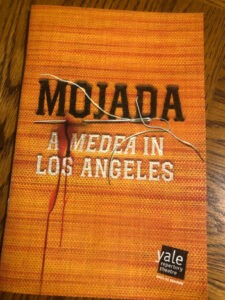
Mojada At Yale Rep
The play’s title is Mojada, which literally means “wet” in Spanish, the feminine form of the Mexican slur for “wetback.” The play’s subtitle is A Medea in Los Angeles, so you know things aren’t going to end well. And I’m not talking about the traffic on the 101, which runs through LA’s gritty Boyle Heights neighborhood where the play is set.
Playwright Luis Alfaro, who is the recipient of one of those MacArthur “genius” grants, has made something of a career of adapting ancient Greek tragedies to present day Chicano settings. He is also not adverse to changing the setting to match the venue; when Mojada was mounted at New York’s Public Theatre in 2019 the action was set in Corona, Queens.
In Mojada Alfaro has grafted a tale of quiet desperation and betrayal among the undocumented immigrant population of present-day California onto the skeleton of Euripides’ 2,450-year-old tragedy Medea, and done it rather neatly.
Those familiar with the ancient tale will be able to connect the dots. Others will be gripped by horrific events that, in the style of the ancient Greeks, are not shown but recounted by the play’s characters.
It’s a powerful story, which no doubt is why it has captured the imaginations of audiences for the past two and half millennia. For the most part, Alfaro’s updating works remarkably well, with well drawn characters and muscular dialog. He occasionally overwrites; the villainess of the piece is so overwrought that if she had had a mustache she would have twirled it.
Alfaro has added a few distinctly Mexican flourishes to the play. Medea and Hason (the Jason figure) meet cute when he mistakes her imitation of the call of the guaco, a raptor native to their home state of Michoacán, for the real thing. The poisoned gift Medea sends to her rival takes the form of a black dress with a sinuous snake on the back. At play’s end Medea is apotheosized as that bird of prey. I’m guessing that the allusion to the coat of arms on the Mexican flag was intentional.
If Alfaro has done a more than workmanlike job of updating Euripides, the question remains, to what end?
Mojada contains a searing critique of the ways in which “the American dream” can become a nightmare for dispossessed members of a foreign, more “traditional” culture who have few opportunities to begin climbing the economic ladder. I couldn’t help thinking, however, that the Greek tragedy backdrop tended to diminish rather than amplify this message.
Perhaps, it’s just my curmudgeonly irritation at the seeming tsunami of adaptations being produced by the current generation of playwrights. What a powerful play a talented writer like Alfaro might produce if he drew directly from the lived experience of his characters rather than use the crutch of a plot devised by a very dead white male!
If I had my reservations about the play, I had none about the production it is receiving under the guidance of director Laurie Woolery.
Mojada is one of the sturdiest productions I have seen at Yale Rep in a good long while, starting with the terrific set by Marcello Martínez García depicting the backyard of a faded house ripe for gentrification. In an apt touch, he has bordered the stage with a reproduction of the border wall at it highest – 27 feet. It serves as a chilling symbol of the barriers facing the increasing number of people across the world who are on the move searching for a fragment of peace and security.
Lighting by Stephen Strawbridge, sound design Bryn Scharenberg, and projections by Shawn Lovell-Boyle often work together to provide a vivid picture of Boyle Heights, as when a police helicopter passes overhead, shattering whatever privacy Medea’s backyard might offer. The costumes by Kitty Cassetti are apt and the poisoned black dress is smashing.
Woolery has drawn powerful performances from her cast, especially Camila Moreno as Medea, Alejandro Hernández as her husband Hason, Alma Martinez as Tita, who functions a bit like a Greek chorus, and Mónica Sánchez as the villainous Armida.
Mojada continues at Yale Rep though April 1, 2023. For more information, visit the Yale Rep website.
Don’t miss another review. Follow OntarioStage on Twitter.
For a complete Index of Reviews, CLICK HERE

